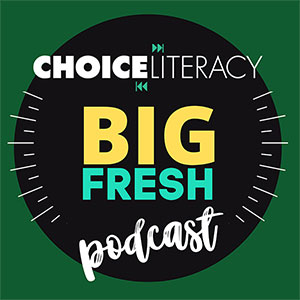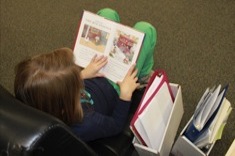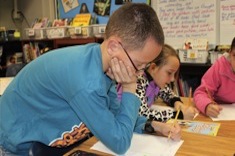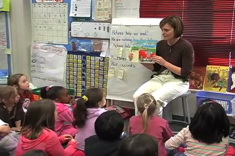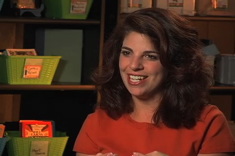Tom Newkirk chats with Brenda Power about his book The Art of Slow Reading. Newkirk is a professor at the University of New Hampshire, and the author of many acclaimed books for teachers.
A full transcript is available below the player.


Brenda Power: Tom, The Art of Slow Reading is just a fabulous book. I was wondering if you could talk a little bit about the genesis of the book. In the book you talk about a swimming partner who really introduced you to the slow food movement, and then you also talked about how the book really started as an article in a professional journal. Can you talk about where the ideas came from and how they kept growing over time?
Tom Newkirk: I think it started with a guy I swim with, who is interested in the slow food movement. As I thought about it, I thought there’s a connection between the kind of relationship you have with food and the relationship you have with reading. Of course, I thought I was the first person to ever come up with that idea. Other people have thought of that, too, and, of course, we talk about taste in reading and devouring books, so it’s not that new.
But it also came from my own sense of what reading is. I think that’s at the heart of the book, that reading is this real relationship you have with an author, with a text. It’s intimate, it’s personal, it’s thoughtful, and I wanted to talk about practices where people can engage with reading in that way.
Brenda Power: One of the things that struck me early in the text – people when they hear the title, The Art of Slow Reading, they might say, “Well, I don’t want to go slow. I can’t go slow.” One of the things you talk about early in the book, connected to the slow food movement, is it’s not really about going slow as much as it’s about finding the right pace for you and for that particular text. Can you talk a bit about that?
Tom Newkirk: I make a comparison to hiking. I take people up in the White Mountains a lot hiking, and I say the key thing is to find the right pace for you, the pace where you’re really enjoying this hike, because if you try to go too fast you’re not going to enjoy it, and if you go too slow you’re probably not going to enjoy it either. Part of it is finding the right pace where you feel like you’re totally engaged with it. I think what happens in school, and happens in testing, is schools send the message that the right pace is a fast pace, and that if you’re working at a fast pace, you’re more efficient, you’re more productive, you’re better.
We even have a lot of testing where, I think, the premium is put on speed. So I think it’s finding the kind of pace at which you’re fully engaged with the reading. But I also think that, even sometimes when you read quickly it’s often interesting to go back and find a passage that you really liked, and read that maybe more slowly, and I think in teaching we often do this. Read through the book but then let’s go back and look at things more carefully, and I think there’s real pleasure in that, too.
Brenda Power: When I read the book I thought about the whole issue of reading pace in testing, and the book brought back lots of memories for me of passages I read slowly, even though I’m a quick, sloppy reader as a whole. It made me think about one of my best friends in college, Paul, who really was the most brilliant person I knew, just very quiet, modest. He could sit in a Shakespeare seminar with someone who was teaching it 25 years, and find new things in the text.
Paul was a horrible standardized test-taker. He would look at something – and you talk about this when you talk about students from some of your freshman seminars and class – if he’d get to that section of an analogy he would say, “Well, Ford is to automobile…” and he would spend ten minutes thinking about how an armadillo really could be to a refrigerator just like that. I think he would come out of those tests with a dozen ideas for great poems and a really, really lousy score.
It made me realize that, in my heart of hearts, I know that the standardized tests don’t measure intelligence because I knew someone like Paul, and I wonder how many of the people reading this book are those very, very bright, slow readers themselves, or they know someone that just can’t perform and is truly brilliant. I thought that was a gift, of taking people back to their own experiences, and people they know, who read in different ways that aren’t necessarily acknowledged by the culture.
Tom Newkirk: One thing that’s happened is people – not that I’ve gotten thousands of e-mails or anything – but I do hear from people who have read it or heard the idea and say, “Gee, I’m a slow reader and I always thought it was a problem but I really kind of enjoy reading slowly. I think I’m good when I read slower.” I think there are people who are really proficient, thoughtful, slow readers who really don’t have that top speed gear. I mean, I don’t have it.
And I think that when we make the norm – like if you don’t read at this speed you’re really not doing the job, or set up courses where you have to read so much that certain readers can’t finish everything – I think we really have to rethink that. I could never be an English major because I could never finish the books in the time that they gave me. So I was a religion major. I couldn’t do it. I mean, that’s not bad but I just couldn’t do it.
Brenda Power: To me that’s fascinating. I think a gift of the book, too, is it really took me out, and I think it takes people who read it out of this defensive reactionary mode, we just are forced into now in education. You’re just going along, trying to do your job and find joy in it, and then you get these awful things thrown at you that make you say, “Oh, no, no, no. Wait, wait, wait. That’s not how it works,” and always from a defensive stance. I think the book really talks a lot about the joys and pleasures of reading, and finding that pace, and really being touched by what you read.
Tom Newkirk: Sometimes I think we want to say reading makes you a better person – you have to read because it makes you a better person. There’s this kind of puritanical moral quality to our claims about reading, and I really think it’s about pleasure, and not just easy pleasure but a kind of deep pleasure and a kind of happiness that you get when you’re really in touch with an author.
To me, that’s the big claim for that kind of reading, not that it’s going to make us competitive with the Finns or the Chinese, but that there’s a kind of deep, profound pleasure that we can get from really being attentive to well-written writing. I think that’s the appeal, so that is what I’m trying to get at.
Brenda Power: You have a great story in there from when you were, I think, a teenager, and those of us who have teenagers can relate. You’re sitting on the couch and you’re shoveling potato chips in your mouth, and then your dad walks by and tells a story of one bag of chips. Can you share that and talk a little bit about that scarcity and abundance and pleasure in reading that you were conveying with that?
Tom Newkirk: The story is, I was maybe ten years old or something like that and I’m just eating potato chips, kind of the way I eat them now, just stuffing them in my mouth, crumbs all over my shirt. My dad is just looking at me. He grew up in an orphanage in Ohio, and he says, “When I was a kid, we would get this one bag of chips once a year, at Christmas time,” and I thought, “Oh my God. Potato chips will never taste this good to me as they did to you that one day.” So there’s something about scarcity that makes things more valued, and I think with just words all around us – on the Internet and just so accessible – we lose the value of it, in a way.
I mean, I don’t think we can ever go back in a time machine to an earlier time when books of poetry were called “treasuries,” but I think we can try to imagine what it’s like, even if we’re reading a book, just to think, “This is really valuable. I’m really going to spend some time with this. This is a little treasure here. I’m going to really treat it that way.” And I think if we do, we really get a lot more out of it.
But even like proficient readers, like “I want to get through this book to get on to the next book,” and this kind of big consumption, I think to try to imagine what it’s like when you maybe didn’t have that much to read, and what you had to read really had to have value, and you reread it and you got more out of it with each rereading. So maybe just to try to imagine what it’s like to take that stance.
Brenda Power: And I really like some of the practical ideas in the book, to help people get back to that stance. You talk about proficient readers and a big piece of that has been marking up text, and the idea is you’ll become more efficient and more skilled if you mark where you’re confused, or you mark important ideas, to highlight. You talk about marking text as a way to really slow down, or to get to a better, different pace, to find more pleasure in text. Can you talk a little bit about that?
Tom Newkirk: I think if you don’t mark a book, you almost lose your anchors in the book. Some of the things that I’d recommend, that I do almost instinctively, and I think a lot of readers do instinctively, I say, “What are the key words?” If somebody is making an argument, a poem, what are the words that stand out? If you could just identify what you think some of the key words are and mark those, then you have a way of thinking about what that author is saying.
I think sometimes if you don’t mark at all you kind of have this general sense of the book but you don’t have any points where you can go back to or points where you can really think about the book, or the article, or whatever, so I think things like that, finding a key sentence.
And I think that one of the things that we should do always is to really read beginnings carefully, whether we mark them or not just to really slow down when we’re reading beginnings because I think they’re so crucial to setting up a what a writer is trying to do, and I think sometimes students just float in on the beginning and don’t really do the kind of work we need to do with that. So I think marking, slowing down, attending to a passage, because I think when we do we see there’s a lot more there than we thought.
Brenda Power: I also love the section of the book where you talked about, I think, sometimes it’s the next step, when you find something new you really love to memorize it. It took me back to bits and pieces of poems and things I’ve memorized. Just your discussion of that, thinking about how, when you memorize something, it becomes part of your essence.
It’s one thing to have all these books you’ve read and they’re part of who you are, but there’s something much deeper with something you’ve memorized and can pull out when you’re 14 or when you’re 40. Can you talk about that? You had mentioned this elegant elementary school tea where the teacher had students share memorized poems.
Tom Newkirk: Well, they call it learning by heart. I think that’s a wonderful expression, learning by heart. Think about that, that you kind of hold it in your body and it almost becomes part of who you are. Augustine and people throughout our history who talked about memorization, they said when you memorize something it often comes back to you at a time of affliction, and when somehow that thing you’ve memorized has relevance. It isn’t just rote. It comes back to you at times when you need it.
And another thing is I think when we memorize stuff it stays with us a long time, particularly if we memorize it when we’re young. One of the stories I tell in the book is this minister who works with people with dementia and Alzheimer’s, really the last stages of selfhood. One of the last things that they can hold onto are the words to hymns that they learned as children or as young adults, that that’s the last thing.
So she would sing with them and they still have these things memorized, and that’s the last thing, the last thread of selfhood that they have. I think, God, that’s powerful to think that’s the last thing you have left, so to hold things that way, I think, makes a lot of sense.
Brenda Power: You have that incredibly touching story of your brother with your father as he was dying and that psalm that was repeated until there was that last breath. It was so powerful. I wanted to just close with some of your words, the last words in the book. You said we should emphasize beginnings, but I think this is the perfect ending to your book. You wrote, “We need to put away the stopwatch and say, in every way possible, ‘This is not a race.’ Take your time. Pay attention. Touch the words and tell me how they touch you.” So I just want to thank you, Tom, for writing such a thoughtful, meaty, provocative book. It’s really going to be what everyone is talking about for a good long while to come.
Tom Newkirk: Thank you. I really appreciate that.

